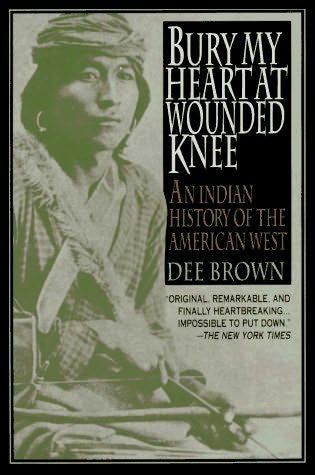Native American Literature - Post 1
Ever since I first heard my very first CD of Native American Music, which was some 10 years back... I have been interested in everything Native American... read Indigenous American. This and subsequent posts on the topic would be an attempt to form a Native American Nook, where in the choicest of Native American Literature can be explored and reviewed.

I start this collection with Bury My Heart At Wounded Knee: An Indian History of the American West by Dee Brown.
This is one extraordinary book, complete with photographs of yesteryear native american chiefs and their families. What I liked about this book, was the fact that it was one of the first books which was written from a totally Native American perspective. It is not only an interesting rendition of history, but it is also heartbreaking... at least it was so for me.
Beginning with the Long Walk of the Navajos in 1860 and ending 30 years later with the massacre of Sioux men, women, and children at Wounded Knee in South Dakota, it tells how the American Indians lost their land and lives to a dynamically expanding white society. History is always written by the victors, so while the whole world knew about "Manifest Destiny" and Martin Luther King's american civil war, none were privy to the plight of the Native Americans that were herded off to closed lands that are now called Native American Reserves.
First published in 1970 this book is an excellent example of the adage that "being one-sided is not telling the whole truth." You almost come a full circle, after reading this book, and you then start looking at its beginning with new eyes. So be prepared to be emotionally affected by this book.
My favourite quote from the HBO Movie of the same name (based on the same book):
Charles Eastman: And now you speak of coercion. I don't understand.
Henry Dawes: If we don't put that land into the hands of individual Indians in five years- less-homesteaders and ranchers will demand it all... for nothing. The Indian must own his own piece of earth, Charles.
Charles Eastman: Did you know that there is no word in the Sioux language for that, sir?
Henry Dawes: For what?
Charles Eastman: To "own the earth." Not in any native language.
Henry Dawes: Well, then perhaps you should invent one.
Happy Reading!!!
November 25, 2008 - Wise Words for the Day:
"The test of every religious, political, or educational system, is the man which it forms. If a system injures the intelligence it is bad. If it injures the character it is vicious. If it injures the conscience it is criminal."
--
Henri Frederic Amiel,
"Heart Failure: Diary Of A Third Year Medical Student"

